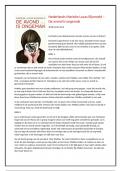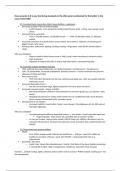Lecture I
know the diagnostic criteria mentioned in the lectures, not the whole DSM-5
approx. 45 MCQs
- mock exam – very similar difficulty to actual exam
- both lectures & tutorials
TIPS for reading scientific papers:
- discussion à most important part
Stress
What is stress?
- external demands placed on an organism
- organism’s internal biological & psychological responses to such demands
(1) stressor
• physical – heat, cold, noise
• psychological - conflicts, competition
(2) strain
• physical – direct tissue damage
• psychological – adverse emotional
(3) stressor*strain
• continuous interactions and adjustments between individual & environments
(transactions)
Stress: Dimensions of responses:
(1) physical symptoms
• allergies
• headaches
• sweating
(2) psychological symptoms
• low self-confidence
• depression
• negative emotions – anger, fear, sadness
(3) maladaptive coping behaviour
• resting badly
• being less active
• bad nutrition/binge eating
• substance abuse
Quality
Þ Distress
• “bad” side of stress
Þ Eustress
• stress that is triggered by positive events in life
• e.g.: wedding, promotion at work
• less negative responses from the body compared to distress
Does Stress influence our behaviour?
Þ stress influences behaviour
• effect of stress on eating
o overeat
, § women are more likely to do that when they’re stressed
o undereat
§ men are more likely
o no change
• substance use
o alcohol
o cocaine
o social drinkers (control group)
o drug/alcohol cue => higher desire/craving to drink/take drugs
o stress condition => less craving
What factors determine how we react to stress?
Þ familiarity with stressor influences stress reaction
o getting more familiar with stress = get used to stressor = react in a less negative
way
o stressor would be less intense; shorter in duration
Þ frequency of how you encounter the stressor
o stressors are long in duration à PTSD
Þ level of involvement
o witnesses/survivors of 9/11
o those who are physically close to the incidents or lost sth à more likely to report
PTSD
o more closely you are affected = more stressed
Þ personality factors
o 2 groups of people before the stressor and after intense stressors
§ low social support, procrastinators = higher levels of stress
§ compared to others
, Stress: General Adaptation Syndrome (GAS)
3 stages:
1. Alarm Reaction
- once you perceive external stressor
- body mobilised to prepare for fight or flight
- huge increase in arousal level to prepare the body
2. Stage of Resistance
- arousal remains high
- trying to cope
- energy will be continuously consumed in order to cope with the stressor
3. Exhaustion Stage
- energy level starts to decrease
- arousal decreases
è short stress – ends at stage of resistance
è chronic stress -> go through Exhaustion Stage (which makes stress dangerous )
Transactional Model of Stress
- perceive the presence of the stressor
1. Primary appraisal
- interpret whether the stimulus is a positive/negative/irrelevant event
- if stressor = threat
- then go to
2. Secondary Appraisal
- see if they have enough resources to deal with it
3. Cope/Reappraise
- if stress => come up with coping mechanisms
Measuring Life Stress
Þ Life Events (Holmes & Rahe)
o social readjustment scale – questionnaire
§ negative vents in life + score
§ remember whether you have encountered the events in the past 2 years
o aim: over 300 points you are more likely to developed health problems that are
induced by stress
§ heart attacks
§ leukaemia
§ flu
o (-) requires memorising all the negative events
§ memory biases - makes the Q less precise
o (-) no causal connections
§ score high à doesn’t mean that those stressor cause health problems later
on
Þ Daily Hassles – an alternative
o minor/annoying events occurring on a daily basis
§ add up to create a stressful event
o better than the previous one
§ assessing the events on a daily basis (got rid of the memory biases
problem)
know the diagnostic criteria mentioned in the lectures, not the whole DSM-5
approx. 45 MCQs
- mock exam – very similar difficulty to actual exam
- both lectures & tutorials
TIPS for reading scientific papers:
- discussion à most important part
Stress
What is stress?
- external demands placed on an organism
- organism’s internal biological & psychological responses to such demands
(1) stressor
• physical – heat, cold, noise
• psychological - conflicts, competition
(2) strain
• physical – direct tissue damage
• psychological – adverse emotional
(3) stressor*strain
• continuous interactions and adjustments between individual & environments
(transactions)
Stress: Dimensions of responses:
(1) physical symptoms
• allergies
• headaches
• sweating
(2) psychological symptoms
• low self-confidence
• depression
• negative emotions – anger, fear, sadness
(3) maladaptive coping behaviour
• resting badly
• being less active
• bad nutrition/binge eating
• substance abuse
Quality
Þ Distress
• “bad” side of stress
Þ Eustress
• stress that is triggered by positive events in life
• e.g.: wedding, promotion at work
• less negative responses from the body compared to distress
Does Stress influence our behaviour?
Þ stress influences behaviour
• effect of stress on eating
o overeat
, § women are more likely to do that when they’re stressed
o undereat
§ men are more likely
o no change
• substance use
o alcohol
o cocaine
o social drinkers (control group)
o drug/alcohol cue => higher desire/craving to drink/take drugs
o stress condition => less craving
What factors determine how we react to stress?
Þ familiarity with stressor influences stress reaction
o getting more familiar with stress = get used to stressor = react in a less negative
way
o stressor would be less intense; shorter in duration
Þ frequency of how you encounter the stressor
o stressors are long in duration à PTSD
Þ level of involvement
o witnesses/survivors of 9/11
o those who are physically close to the incidents or lost sth à more likely to report
PTSD
o more closely you are affected = more stressed
Þ personality factors
o 2 groups of people before the stressor and after intense stressors
§ low social support, procrastinators = higher levels of stress
§ compared to others
, Stress: General Adaptation Syndrome (GAS)
3 stages:
1. Alarm Reaction
- once you perceive external stressor
- body mobilised to prepare for fight or flight
- huge increase in arousal level to prepare the body
2. Stage of Resistance
- arousal remains high
- trying to cope
- energy will be continuously consumed in order to cope with the stressor
3. Exhaustion Stage
- energy level starts to decrease
- arousal decreases
è short stress – ends at stage of resistance
è chronic stress -> go through Exhaustion Stage (which makes stress dangerous )
Transactional Model of Stress
- perceive the presence of the stressor
1. Primary appraisal
- interpret whether the stimulus is a positive/negative/irrelevant event
- if stressor = threat
- then go to
2. Secondary Appraisal
- see if they have enough resources to deal with it
3. Cope/Reappraise
- if stress => come up with coping mechanisms
Measuring Life Stress
Þ Life Events (Holmes & Rahe)
o social readjustment scale – questionnaire
§ negative vents in life + score
§ remember whether you have encountered the events in the past 2 years
o aim: over 300 points you are more likely to developed health problems that are
induced by stress
§ heart attacks
§ leukaemia
§ flu
o (-) requires memorising all the negative events
§ memory biases - makes the Q less precise
o (-) no causal connections
§ score high à doesn’t mean that those stressor cause health problems later
on
Þ Daily Hassles – an alternative
o minor/annoying events occurring on a daily basis
§ add up to create a stressful event
o better than the previous one
§ assessing the events on a daily basis (got rid of the memory biases
problem)






